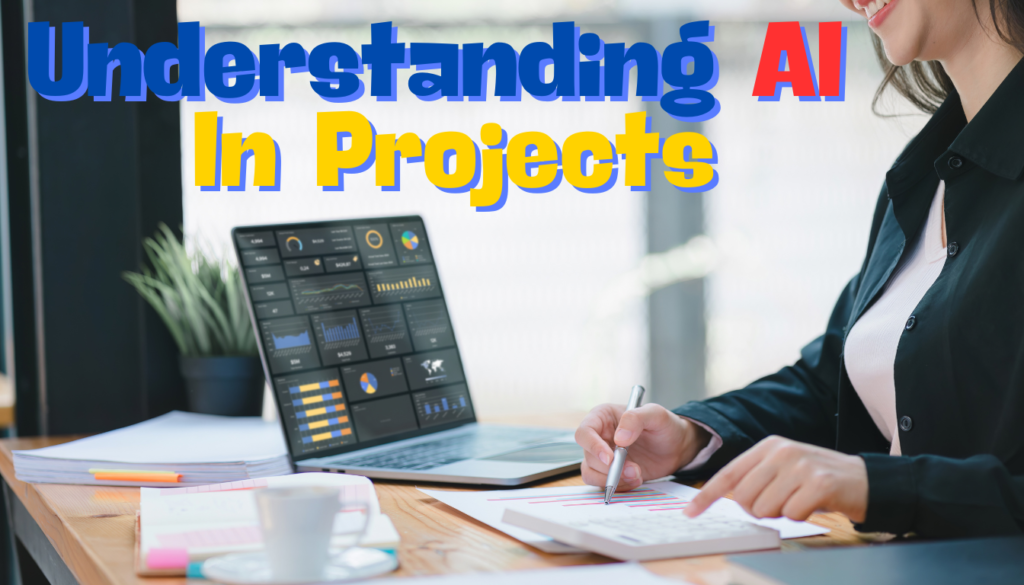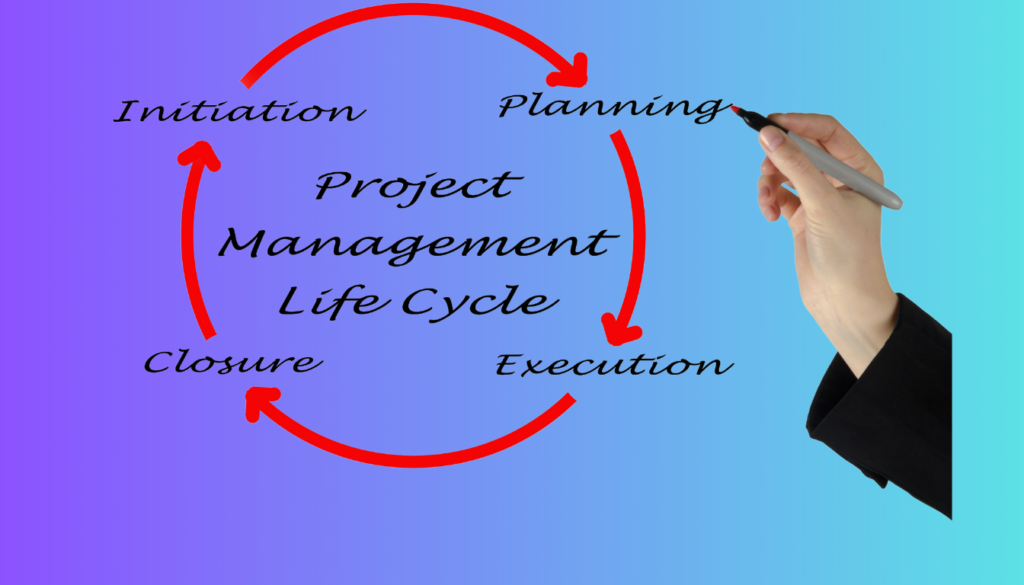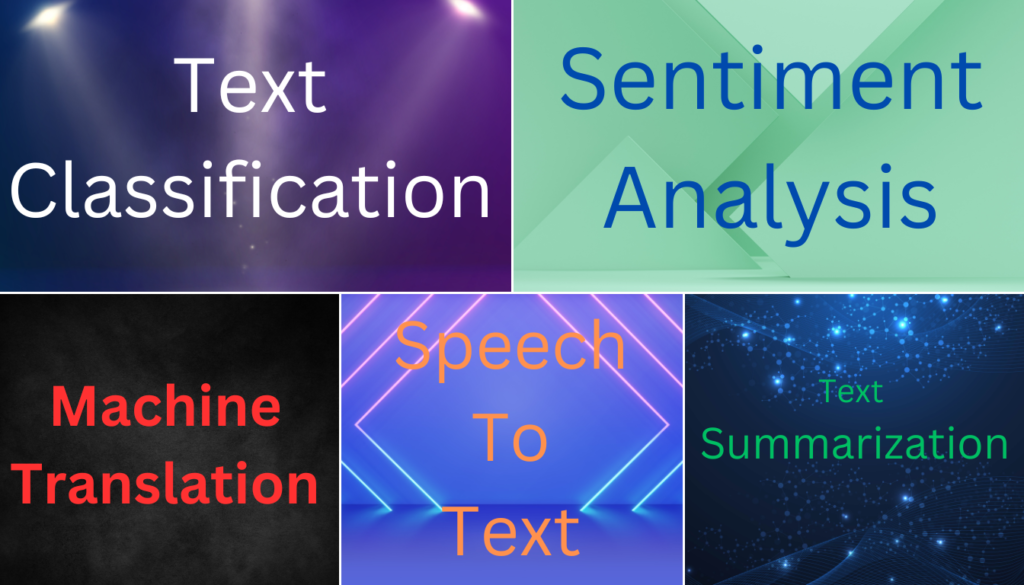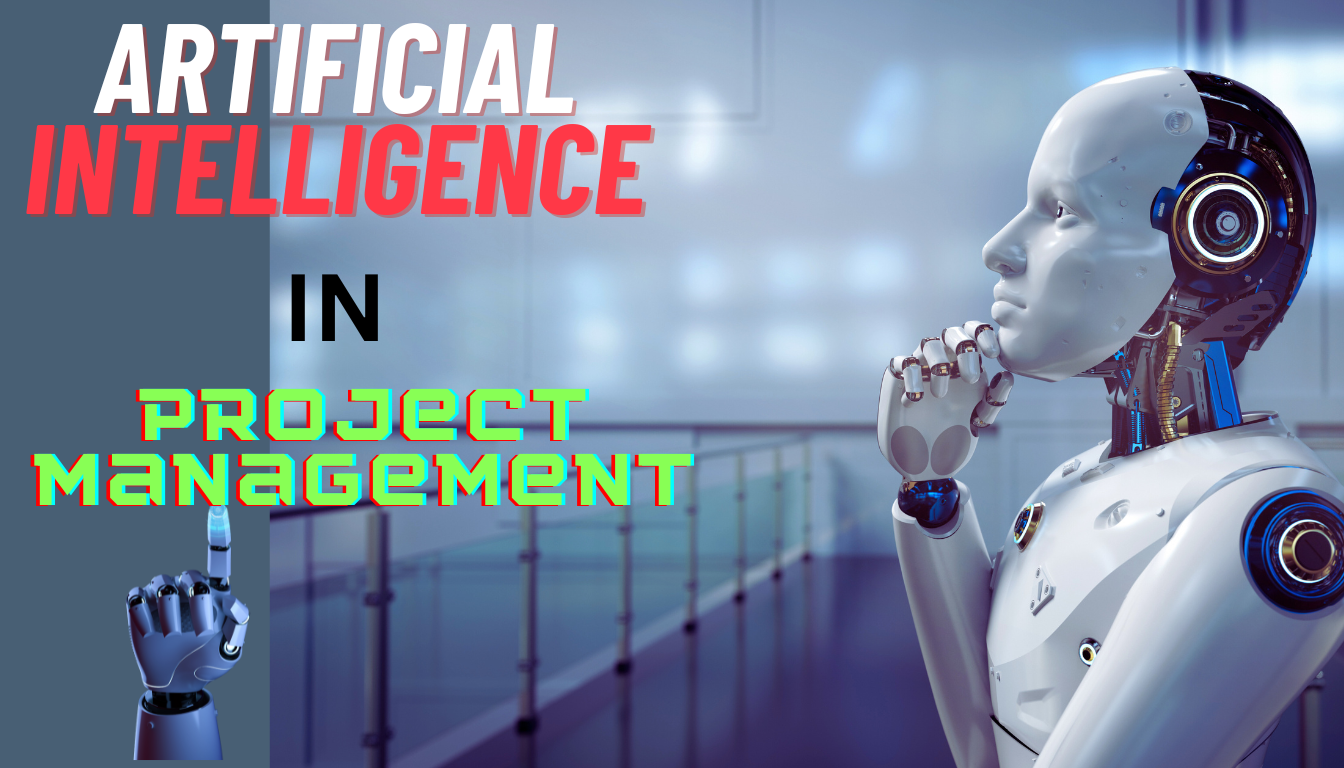Introduction
Artificial Intelligence (AI) in project management refers to the application of AI technologies and techniques to improve the planning, execution, and management of projects. AI leverages machine learning, data analytics, natural language processing, and automation to enhance various aspects of project management, making processes more efficient and decision-making more informed.
We will explore the fundamentals of AI in project management, delve into its key applications, and highlight real-world examples where AI is making a significant impact. Whether you’re a seasoned project manager or new to the field, understanding how AI can be integrated into your project strategies will provide you with valuable insights and a competitive edge in managing projects more efficiently and effectively.
Table of Contents
Understanding Artificial Intelligence in Project Management

Artificial Intelligence refers to the simulation of human intelligence in machines that are designed to think and learn like humans. In the context of project management, AI can automate routine tasks, analyze vast amounts of data, and provide valuable insights to project managers.
AI enhances project management by automating processes, providing data-driven insights, and improving decision-making. Here are some specific ways AI is used in project management:
Automated Scheduling and Resource Allocation
AI tools can create and optimize project schedules by analyzing data from past projects and current resource availability. This reduces manual scheduling effort and improves accuracy, helping to keep projects on track and within budget.
Risk Management
AI can identify potential risks early by analyzing project data and identifying patterns that suggest issues. This allows project managers to proactively address risks and develop mitigation strategies.
Enhanced Communication
AI-driven Natural Language Processing (NLP) tools can automate the summarization of project meetings and documentation, ensuring that key points are captured and communicated effectively. This improves information flow and keeps stakeholders informed.
Decision Support
AI systems can analyze large volumes of project data to provide actionable insights and recommendations. This supports project managers in making informed, timely decisions based on comprehensive data analysis.
How to Get Started with AI in Project Management

Integrating Artificial Intelligence (AI) into project management can seem daunting, but with the right approach, it can significantly enhance the efficiency and effectiveness of your projects. Whether you are a novice or an experienced project manager, these steps will guide you on how to effectively get started with AI in project management.
Assess Your Current Project Management Processes
Before integrating AI, it’s essential to understand your current project management processes and identify areas where AI can add the most value.
- Action Steps:
- Conduct a thorough review of your existing project workflows, tools, and outcomes.
- Identify pain points, inefficiencies, and areas where decisions could be data-driven or automated.
2. Educate Yourself and Your Team on AI
Understanding AI and its capabilities is crucial. Invest time in educating yourself and your team about AI’s potential benefits and challenges in project management.
- Action Steps:
- Attend workshops, webinars, and training sessions on AI.
- Subscribe to relevant publications and online resources to stay updated on the latest AI developments and best practices.
3. Start Small with AI Tools and Applications
Begin your AI integration journey with small, manageable projects before scaling up. Choose tools that require minimal investment and provide significant learning opportunities.
- Action Steps:
- Select AI-enhanced project management tools that offer features like automated scheduling, resource allocation, or risk management.
- Implement these tools in smaller, low-risk projects to gauge their effectiveness and learn from the experience.
4. Leverage AI for Data Analysis and Decision Support

Use AI tools to analyze project data and support decision-making processes. AI can uncover insights from past project data, helping to predict future trends and improve planning accuracy.
- Action Steps:
- Implement AI-based analytics tools to process and analyze historical project data.
- Use insights gained from AI to optimize project schedules, resource management, and risk mitigation strategies.
5. Monitor AI Integration and Gather Feedback
Continuously monitor the effectiveness of AI tools and gather feedback from team members on their experiences and the challenges faced.
- Action Steps:
- Regularly review the performance and outcomes of AI-integrated processes.
- Solicit and incorporate feedback from all stakeholders to improve AI usage and address any issues.
6. Scale AI Adoption Based on Results and Feedback
Based on the initial experiences and feedback, refine your AI strategy and scale your AI integration across more significant parts of your projects.
- Action Steps:
- Expand the use of AI tools to more complex projects and broader aspects of project management.
- Continually update and train your team on new AI features and best practices.
Key Applications of AI in Project Management
| Component | Description | Applications in Project Management |
|---|---|---|
| Machine Learning (ML) | A subset of AI where systems learn from data patterns and improve over time without explicit programming. | – Analyzing past project data to predict future outcomes. – Optimizing project schedules and resource allocation. – Enhancing project forecasting and planning accuracy. |
| Natural Language Processing (NLP) | AI technology that enables machines to understand and process human language. | – Automating the analysis of project documentation, emails, and meeting notes. – Providing insights and summaries. – Enhancing communication and information management. |
| Robotic Process Automation (RPA) | AI-driven technology that automates repetitive, rule-based tasks without human intervention. | – Streamlining administrative tasks like updating status reports. – Managing routine workflows. – Automating project tracking and reporting. |
| Predictive Analytics | Using historical data to make predictions about future outcomes. | – Forecasting project risks and completion times. – Predicting budget overruns and resource needs. – Identifying potential bottlenecks and planning mitigation strategies. |
| Automated Scheduling | AI tools that create and optimize project schedules based on data analysis. | – Reducing manual effort in creating schedules. – Improving accuracy in timeline planning. – Keeping projects on track by adjusting schedules dynamically based on project progress. |
| Decision Support Systems | AI systems that analyze large volumes of data to provide actionable insights and recommendations. | – Supporting project managers in making informed decisions. – Analyzing project metrics and data trends. – Offering recommendations for resource allocation and project strategies. |
| Real-Time Monitoring | AI tools that provide real-time insights into project performance and progress. | – Tracking project progress continuously. – Identifying deviations from plans early. – Enhancing visibility into project status for timely interventions. |
| Risk Management | AI capabilities that identify and analyze potential risks based on data patterns. | – Proactively identifying risks before they impact the project. – Developing and implementing mitigation strategies. – Enhancing the reliability of risk assessments and planning. |
How Artificial Intelligence is Transforming Project Management

Increased Efficiency and Productivity
AI automates routine tasks and processes, allowing project teams to operate more efficiently and focus on critical activities.
Improved Accuracy in Planning and Forecasting
AI’s ability to analyze vast amounts of data leads to more accurate project planning, scheduling, and risk assessment.
Enhanced Decision-Making Capabilities
AI provides data-driven insights and recommendations, supporting more effective and informed decision-making.
Better Resource Management
AI optimizes the allocation and utilization of resources, ensuring that projects are completed on time and within budget.
Real-Time Visibility and Control
AI enables continuous monitoring and real-time visibility into project performance, allowing for proactive management and adjustments.
Benefits of AI in Project Management
| Benefit | Description | Application and Impact |
|---|---|---|
| Increased Efficiency and Productivity | AI automates routine and time-consuming tasks such as scheduling, updating status reports, and managing workflows. | – Automation reduces manual workload, allowing teams to focus on strategic activities. – Increases overall productivity and reduces operational costs. |
| Improved Decision-Making | AI provides data-driven insights by analyzing large volumes of project data to identify trends and recommend actions. | – Enhances decision-making processes by offering actionable insights. – Reduces reliance on intuition and improves project outcomes. |
| Enhanced Accuracy in Planning and Forecasting | AI leverages algorithms and historical data to improve the reliability of project timelines, budgets, and resource estimates. | – Predictive capabilities help forecast timelines, identify potential delays, and predict budget overruns. – Ensures projects are completed on time and within budget. |
| Better Resource Management | AI optimizes the allocation and utilization of resources based on project needs and availability. | – Automates resource allocation, ensuring the right resources are available when needed. – Minimizes idle time and enhances project efficiency. |
| Real-Time Monitoring and Control | AI provides up-to-date insights into project performance and progress through continuous tracking. | – Offers real-time updates on project activities, risks, and issues. – Helps maintain project alignment and control by identifying deviations early. |
| Proactive Risk Management | AI identifies potential risks early and suggests mitigation strategies by analyzing data patterns. | – Proactively manages risks before they escalate. – Reduces the likelihood of project disruptions and improves stability. |
| Improved Communication and Collaboration | AI-driven tools automate the sharing of information and summarizing project updates, enhancing communication and collaboration. | – Facilitates better information flow and ensures all stakeholders are informed. – Leads to more cohesive team efforts and better stakeholder engagement. |
This table provides a structured overview of the benefits of AI in project management, detailing
Challenges and Considerations
Implementing AI in project management involves overcoming technical hurdles, managing change within teams, and addressing initial setup costs.
Technical Integration
Integrating AI tools with existing project management systems can be complex and require significant technical expertise. Ensuring compatibility and seamless data flow between AI tools and current systems is crucial for smooth operation.
Adoption Resistance
Team members and stakeholders may be resistant to adopting new AI-driven tools and processes, fearing job displacement or changes in their work routines. Overcoming this resistance requires effective change management and clear communication about the benefits of AI.
Initial Setup Costs
The upfront costs associated with implementing AI technologies—including software acquisition, training, and system customization—can be substantial. It’s important to budget for these expenses and consider the long-term return on investment.
Data Privacy and Security

AI systems rely heavily on data, making data privacy and security paramount concerns.
Data Sensitivity
Projects often handle confidential information. Ensuring that AI tools adhere to data privacy regulations and protect sensitive information is essential. This involves implementing strong data governance policies and using secure systems for data storage and processing.
Security Risks
AI systems can be vulnerable to cyber threats. Robust security measures must be in place to protect AI tools and the data they process from unauthorized access and breaches. Regular security audits and updates are crucial to maintaining system integrity.
Dependence on Quality Data
The effectiveness of AI in project management is largely dependent on the quality of the data it uses.
Data Accuracy
For AI to provide reliable outputs, the data fed into AI systems must be accurate and up-to-date. Ensuring high data quality is a continuous challenge and requires rigorous data validation processes.
Data Completeness
Incomplete data can result in biased or skewed AI analysis. Collecting comprehensive data that covers all relevant aspects of the project is crucial for effective AI performance.
Adapting to Change
Integrating AI into project management requires significant changes in workflows, processes, and team dynamics.
Cultural Shift
Adopting AI often necessitates a shift in organizational culture, embracing data-driven decision-making and automation. This can be challenging for teams accustomed to traditional methods. Encouraging a mindset that welcomes innovation and continuous improvement is key.
Skill Development
Project managers and team members may need to acquire new skills to effectively use AI tools and interpret AI-driven insights. Providing ongoing training and support helps teams adapt to these new technologies.
Managing Expectations
AI is often perceived as a silver bullet for project management challenges. Managing expectations about what AI can realistically achieve is crucial.
Realistic Goals
AI should be seen as a tool that enhances human capabilities rather than replacing them. Setting realistic expectations about AI’s role and impact helps in its effective integration and prevents disappointment.
Continuous Improvement
AI technologies and their applications in project management are constantly evolving. Continuous learning and adaptation are necessary to keep up with advancements and leverage AI effectively.
Real-World Examples of AI in Project Management
| Company | AI Application | Description | Impact |
|---|---|---|---|
| IBM | AI for Project Risk Management | IBM uses Watson to analyze project data, predict potential risks, and recommend mitigation strategies. | Improved risk foresight and mitigation, leading to better project outcomes and reduced delays and cost overruns. |
| Accenture | AI-Driven Resource Management | Accenture uses AI algorithms to match project requirements with workforce skills and availability. | Enhanced resource utilization, minimized staffing gaps, and improved project delivery timelines. |
| Microsoft | AI for Automated Scheduling | Microsoft’s AI in project tools like Microsoft Project automates scheduling based on task dependencies, resource availability, and deadlines. | Reduced time and effort in creating schedules, improved accuracy and adaptability of project timelines. |
| Airbus | AI-Enhanced Quality Control | Airbus employs AI to analyze production data and detect quality anomalies in real-time. | Maintained high manufacturing standards, reduced defects, cost savings, and improved customer satisfaction. |
| Siemens | AI for Predictive Maintenance | Siemens uses AI to analyze sensor data from machinery to predict and schedule maintenance before failures occur. | Increased equipment uptime, lower maintenance costs, and reduced operational disruptions. |
Future Trends in AI and Project Management
The integration of Artificial Intelligence (AI) in project management is set to deepen, with emerging technologies continually reshaping how projects are planned, executed, and monitored. Understanding these future trends is crucial for project managers seeking to stay ahead in an increasingly automated and data-driven environment.
Greater Integration of AI Across All Project Phases
As AI technology advances, its integration into every phase of project management will become more comprehensive. AI’s role will expand beyond specific tasks like scheduling and risk management to more holistic management of entire projects.
- Trend: AI will manage projects from initiation to closure, automating decisions based on real-time data and predictive analytics.
- Impact: This will lead to more dynamic project management processes, where AI continuously adapts project plans based on changing conditions and new information.
Advancements in Natural Language Processing

Natural Language Processing (NLP) will become more sophisticated, enabling more nuanced and effective communication between humans and AI systems. NLP will enhance the way project managers interact with AI tools, making these interactions more intuitive and efficient.
- Trend: Improved NLP will allow project managers to query AI systems using conversational language, receive insights, and generate reports through voice commands or natural language queries.
- Impact: This will make AI tools more accessible and easier to use, fostering wider adoption and reducing the learning curve associated with complex software.
3. Predictive Project Analytics Becoming Mainstream
Predictive analytics will move from being an advanced capability to a standard feature in project management software. This trend will focus on not just forecasting risks but also predicting project outcomes with high accuracy.
- Trend: AI-driven predictive analytics will routinely analyze past project data and ongoing project metrics to forecast outcomes and recommend preemptive adjustments.
- Impact: Enhanced predictive capabilities will significantly improve project success rates by enabling proactive management and allowing teams to address potential issues before they impact the project.
4. AI-Powered Personal Assistants for Project Managers

AI-powered personal assistants will become more common in assisting project managers with day-to-day tasks. These assistants will not only handle administrative tasks but also provide strategic insights.
- Trend: Personal AI assistants will help in scheduling meetings, reminding about deadlines, gathering project updates, and even suggesting areas of concern that need attention based on data analysis.
- Impact: These AI assistants will increase the efficiency of project managers by offloading routine tasks and enhancing focus on strategic decision-making.
5. Ethical AI in Project Management
As AI becomes more embedded in project management, ethical considerations will come to the forefront. There will be a growing emphasis on developing and using AI in a way that is transparent, fair, and accountable.
- Trend: Ethical guidelines and standards for AI in project management will be developed to address issues of bias, privacy, and decision transparency.
- Impact: This will build trust in AI applications and ensure that AI-driven decisions are understood and accepted by all stakeholders.
Conclusion and Final Thoughts on AI in Project Management
The journey of integrating Artificial Intelligence (AI) into project management is both exciting and transformative. As we’ve explored throughout this blog post, AI offers a multitude of benefits, from enhancing decision-making processes with data-driven insights to automating routine tasks, thus freeing up project managers and their teams to focus on more strategic initiatives.
Embracing the Future of Project Management
AI is not just a technological upgrade; it’s a paradigm shift that redefines how projects are managed and executed. By adopting AI, project managers can anticipate better project outcomes, more efficient resource use, and improved risk management. However, as with any significant change, the integration of AI into project management practices requires careful planning, ongoing education, and a willingness to adapt and learn from each step of the process.
Overcoming Challenges
While the benefits are significant, the challenges cannot be overlooked. From the technical hurdles of integration to the cultural shifts necessary for adoption, project managers need to approach AI implementation with a strategy that addresses these potential obstacles. Continuous learning and adaptation are essential, as is the need to manage expectations realistically.
The Road Ahead
As AI technology continues to evolve, so too will its applications in project management. Staying informed about new AI developments and understanding their potential applications will be crucial for any project management professional looking to stay competitive in this dynamic field. The future of project management with AI promises not only increased efficiency and effectiveness but also the potential to unlock new levels of innovation within teams and projects.
Final Encouragement
To those on the brink of this digital transformation, the message is clear: start small, learn continuously, and scale intelligently. Embrace the capabilities of AI and let them propel your project management practices into a new era of excellence and achievement. Remember, the goal is not just to manage projects but to lead them successfully into the future.
FAQ on AI In Project Management
What is AI in project management?
AI in project management refers to the use of artificial intelligence technologies, such as machine learning, natural language processing, and predictive analytics, to enhance various aspects of managing projects. These technologies help automate routine tasks, provide data-driven insights, and improve decision-making and efficiency.
How can AI improve project management?
AI improves project management by automating time-consuming tasks, enhancing risk management through predictive analytics, optimizing resource allocation, and providing real-time updates on project progress. It enables project managers to focus on strategic planning and decision-making rather than routine operations.
What are some common AI tools used in project management?
Common AI tools in project management include AI-enhanced software like Microsoft Project, Asana, and Trello that offer features like automated scheduling, resource management, and risk assessment. Other tools include chatbots for team communication and AI-driven analytics platforms for data analysis.
What are the challenges of implementing AI in project management?
Challenges include the high initial costs of implementing AI technologies, the need for significant data inputs to train AI models, resistance to change from project teams, integration issues with existing systems, and ensuring data privacy and security.
Is AI in project management suitable for all types of projects?
While AI can bring significant benefits to many types of projects, its suitability may vary depending on the project’s complexity, the data available, and the specific needs of the project. Smaller or less complex projects may not require the advanced capabilities that AI offers.
How do I start integrating AI into my project management processes?
Begin by assessing your current processes to identify areas where AI can add value. Educate yourself and your team on AI capabilities, start with small pilot projects using AI tools, gather feedback, and gradually scale up AI integration based on your experiences and needs.
What future trends in AI should project managers be aware of?
Project managers should keep an eye on advancements in machine learning algorithms, improvements in natural language processing, and the development of more sophisticated decision-support systems. Additionally, the increasing integration of AI with other emerging technologies like IoT and blockchain could further transform project management practices.




